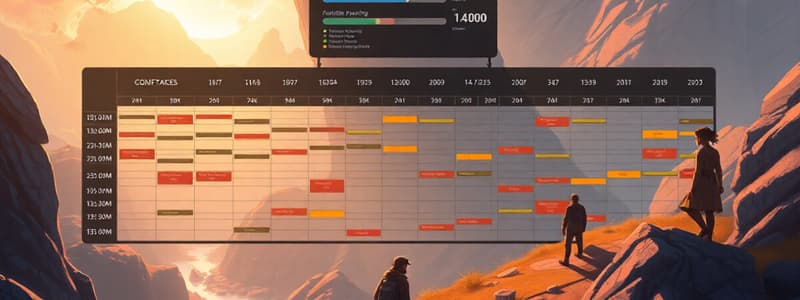Podcast
Questions and Answers
What is the primary responsibility of the scheduler during the project update process?
What is the primary responsibility of the scheduler during the project update process?
- Creating definitive project timelines
- Accumulating data and presenting solutions (correct)
- Maintaining stakeholder relationships
- Identifying project risks
Why is time considered a unique resource for a project scheduler?
Why is time considered a unique resource for a project scheduler?
- It is linear and predictable
- It is always under the scheduler's control
- It can be stored and used at a later date
- It cannot be saved and is constantly in flux (correct)
Which of the following factors is NOT explicitly mentioned as important in scheduling presentations?
Which of the following factors is NOT explicitly mentioned as important in scheduling presentations?
- Estimating weather conditions
- Seasonal conditions
- Availability of resources (correct)
- Weekend interruptions
What should effective scheduling planning respond to according to the content?
What should effective scheduling planning respond to according to the content?
In project scheduling, what role does the concept of compromise play during updates?
In project scheduling, what role does the concept of compromise play during updates?
What is a primary function of the baseline schedule in project management?
What is a primary function of the baseline schedule in project management?
Which of the following is NOT a part of tracking schedule progress?
Which of the following is NOT a part of tracking schedule progress?
In the context of schedule change management, what might necessitate the creation of a new baseline?
In the context of schedule change management, what might necessitate the creation of a new baseline?
What is an essential responsibility of the scheduler during the progress updating process?
What is an essential responsibility of the scheduler during the progress updating process?
Which aspect of the baseline schedule is critical for cash flow planning?
Which aspect of the baseline schedule is critical for cash flow planning?
Flashcards are hidden until you start studying
Study Notes
Schedule Planning & Development
- The scheduler's role is to efficiently manage their time and represent it accurately in their outputs.
- Schedule development involves both creating a baseline schedule and routine updates.
- Changes in scope, circumstances, or outside influences can lead to schedule changes, which require analysis and alternative development.
- Stakeholders, including owners, contractors, subcontractors, and suppliers, can have both positive and negative impacts on the schedule.
- Frequent changes can make it difficult to track progress against the original plan, necessitating a new baseline schedule.
Baseline Schedule
- The baseline schedule serves as the foundation for project execution and is used to measure progress, identify trends and changes, and assess schedule deviations.
- Analysis of the updated schedule against the baseline highlights any variances in milestones or completion dates.
Tracking Schedule Progress
- The process of updating the schedule requires identifying input, logic changes, reporting periods, and actual start and end dates.
- The scheduler must account for these requirements in schedule analysis, forecasting, and reporting.
Schedule Change Management
- Schedule development involves a two-part process: input & data gathering and schedule creation.
- The process of collecting information for the schedule involves:
- Defining the scope of the project
- Developing a work breakdown structure
- Creating a schedule specification
- Gathering stakeholder feedback
- Generating a cost estimate model
- The process of creating the schedule itself includes:
- Choosing the type of schedule
- Defining activities
- Assigning durations
- Specifying relationships between activities
- Incorporating constraints and calendars
- Establishing cost and resource loading
- Conducting quality analysis and compliance reviews
- Documenting the schedule basis
Schedule Scope Determination
- Understanding the project's various elements is crucial in developing the schedule scope.
- This requires detailed knowledge of the work, scheduling tools' limitations, and the ability to communicate the plan effectively.
Schedule Specification
- The schedule specification outlines the minimum requirements for:
- Key milestones and overall contract duration
- Required phasing and sequencing
- Contractor's plans and work processes
- Cost and resource loading and reporting
- Integration with subcontractors and suppliers
- Schedule documentation
- Owner and client requirements
- Schedule types and levels
- Reporting requirements
- Allowed, preferred, or required scheduling software
Stakeholder Feedback
- Understanding stakeholder interests ensures that the schedule is inclusive, encompassing, and responsive to their needs and the project’s goals.
- External stakeholders may include:
- Owners
- Local authorities and community interests
- Permitting and code enforcement agencies
- End users and customers
- Internal stakeholders may include:
- Prime contractor and project management team
- Principal subcontractors
- Second-tier subcontractors
- Suppliers
- Installers
- Startup, testing, and compliance support personnel
Types of Schedules
- Common schedule types include:
- Bar charts (Gantt charts)
- Critical Path Method (CPM)
- Precedence Diagram Method (PDM)
- Program Evaluation and Review Technique (PERT)
- Linear schedule
- Line-of-balance
- Rolling wave
- Milestone
- List
- Critical Chain
- Schedule types may change throughout the project lifecycle and can include:
- Milestone schedules
- Phase schedules
- Area schedules
- Process/system schedules
- Task lists (including work activities, punch lists, commissioning, inspection, submittals, and Requests for Information)
- Control level schedules
Activity Definition
- Activities are the plan or phase that is converted into a schedule model.
- Activities represent direct or indirect work support and are logically linked to form the schedule.
- Key components of an activity include:
- A unique alphanumeric identifier
- A unique descriptive name
- A workday duration
- Additional activity attributes may include:
- Assigned costs and resources
- Constraints
Activity Duration
- Duration refers to the estimated time for an activity to be completed, excluding breaks, holidays, and weekends.
- It becomes the "original duration" for an activity and may include multiple work elements within the activity scope.
Relationships Between Activities
- Activities are logically linked to form a network schedule model, representing the project team's plan to complete the work sequentially.
- Each activity typically has both a predecessor and successor activity, creating a network of dependencies.
- Relationships define the logical connection between activities, and the longest chain of activities determines the critical path.
- The scheduler needs to understand how different types of relationships affect the model and reported data.
Constraints and Calendars
- Constraints can affect the schedule in many ways, including limiting:
- Start date
- Finish date
- Duration
- Resource availability
- Activity relationships
- Calendars define working days, work shifts, and nonworking periods.
- They can influence the calculation of activity durations and affect the overall project schedule.
Studying That Suits You
Use AI to generate personalized quizzes and flashcards to suit your learning preferences.




